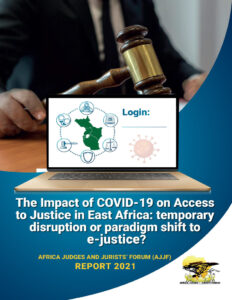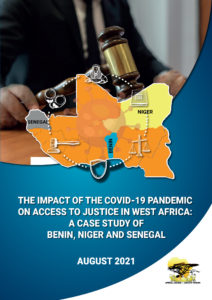
The Impact of COVID-19 on Access to Justice in East Africa: temporary disruption or paradigm shift to e-justice?
Access to justice was a serious problem all over the world even before COVID-19. The 2019 Justice for All report established that 253 million people worldwide face situations of extreme injustice, such as statelessness, slavery and insecurity and that 1.5 billion people had a justice problem that they could not resolve. Also, 4.5 billion are excluded from the opportunity for justice provided by the law because they have no legal identity. Moreover, 5.1 billion people, or two thirds of world’s population, lack meaningful access to justice. Women, children, poor people, persons with disabilities, and people from minority communities find it hardest to access justice.

THE IMPACT OF THE COVID-19 PANDEMIC ON ACCESS TO JUSTICE IN WEST AFRICA: A CASE STUDY OF BENIN, NIGER AND SENEGAL.
Access to justice is one of the areas which suffered serious regressive disruption as a result of COVI-19. In order to enjoy access to justice, certain pre-requisites must be in place. Individuals and groups must have access to independent tribunals where their legal disputes are resolved impartially in accordance with the law.
In an attempt to evaluate and examine the full scope of these challenges, the Africa Judges and Jurists Forum (AJJF) commissioned a study of the impact of the COVID-19 pandemic on access to justice in West Africa, focusing on selected countries as case studies.

The Impact of COVID-19 on Access to Justice in West Africa: A Case Study of the Gambia, Liberia and Nigeria.
In February 2020, the African continent recorded its first case of the COVID-19 infection. However, it was until countries in sub-Sahara African began to record cases of infection that governments on the continent began to adopt measures to contain and manage the pandemic in their respective countries. A common pattern that emerged was the declaration of nationwide states of emergency or other similar mechanisms, the lockdown of social, economic and other activities, the closure of schools, places of worship and government and private offices and the restriction of movement among other measures. Effectively, whole countries were shut down.
Faced with such drastic nationwide measures, and seeing the need for urgent action to safeguard the health and lives of judicial officers, court workers and court users (including litigants and their lawyers), heads of national judiciaries (often the Chief Justices) found themselves compelled to suspend or shut down judicial activities for varying lengths of time.
